Best Audio Editing Software for Windows 11: Free and Paid
Key notes
- I narrowed down 10 of the best audio editing software for Windows 11
- Explore powerful free, paid, and AI solutions
- Whether you need multi-track, mixing, or effects, there’s a solution for you
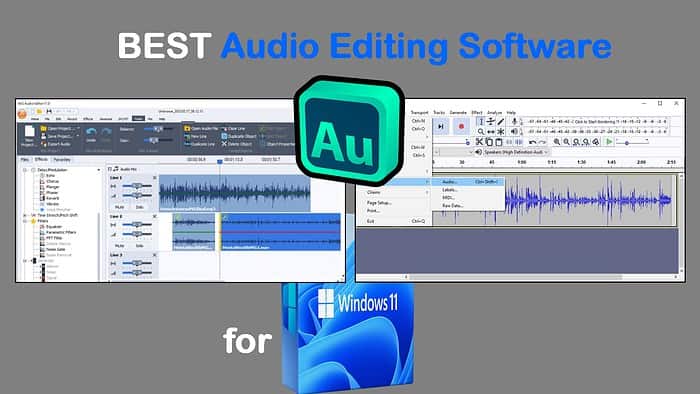
There is a lot of audio editing software on the market, both free and premium. So, I went on the hunt for the best audio editing software for Windows 11. I compared each app and tested their key features, so you can make an informed choice. Here’s everything you need to know:
Top 10 Picks: Best Audio Editing Software for Windows 11
Before diving in, here’s how each audio editor compares at a glance:
| Product | Capabilities | Ease-of-use | System Impact Rating (5 Best) | Free Options |
| AVS Audio Editor | Full Multimedia Suite | 5/5 | 4.5/5 | Free Features w/Audio Watermark |
| Audacity | Full recording, mixing, and editing | 5/5 | 4/5 | Free |
| Adobe Audition | Professional recording, editing, and restoration | 3.5/5 | 3.5/5 | Free Trial |
| GoldWave | Full recording, mixing, and editing | 4/5 | 3.5/5 | 250 Commands per session |
| OcenAudio | Full recording and multitrack editing | 5/5 | 5/5 | Free |
| Cubase | DAW Workstation & Audio Editor | 4/5 | 4/5 | 60-day Free Trial after registration |
| Veed | Online AI Audio Editing | 5/5 | N/A | Free non-AI Editing |
| WavePad | Advanced Recording, Batch Editing, Effects | 4/5 | 3.5/5 | 14-day Free Trial |
| AudioDirector | Full recording, mixing, and editing, with AI | 3/5 | 3.5/5 | 30-day Free Trial |
| Audio Editor/Music Editor | Basic Cut, Merge, Convert | 5/5 | 4/5 | Free |
1. AVS Audio Editor – Full Multimedia Suite
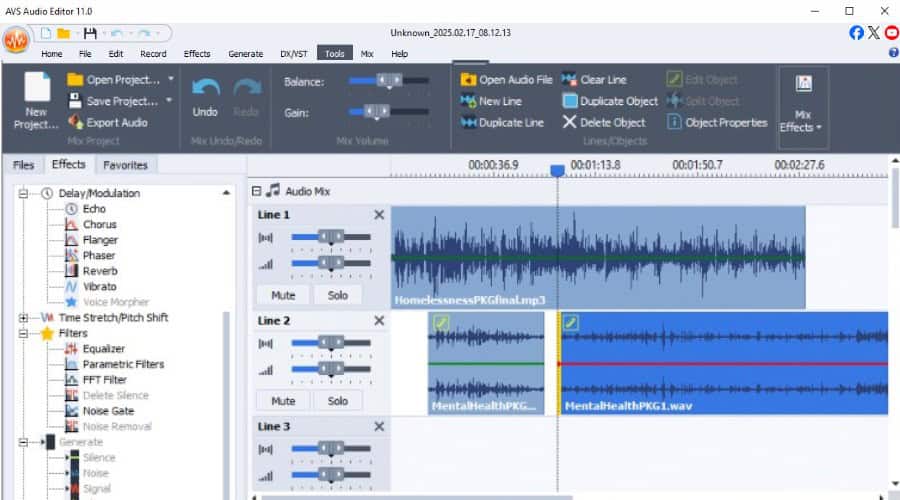
The AVS Audio Editor is just one app, which forms the AVS4YOU Multimedia Suite. As a standalone app you can use it for free with an audio watermark. Purchasing the suite removes this, giving you full access to a comprehensive set of audio editing features.
It stands out for its easy-to-use interface, endless effects and filters, and unique features like a text-to-speech generator.
It offers some of the broadest support for audio file formats, including MP3, FLAC, WAV, M4A, WMA, AAC, MP2, AMR, OGG, and others. Moreover, its free converter supports these formats too.
As an audio editor, it ticks all the boxes, with an editing timeline and multi-track mixing.
Furthermore, you can record directly into the software and use your soundcard as the input. You can even import audio from CDs and video files.
The Windows audio editor also supports third-party DX and VST plugins.
It’s easy for pros and beginners alike, with ample help, such as hover-over explanations of features.
The AVS4YOU 1-year subscription is $49.00, while an unlimited license is $79.00.
| Pros | Cons |
| Supports all conceivable file formats | Free version adds audio watermark |
| Unique text-to-speech generation | |
| Over 20 effects and filters | |
| Paid version includes video editor |
2. Adobe Audition – Best Professional Audio Editor
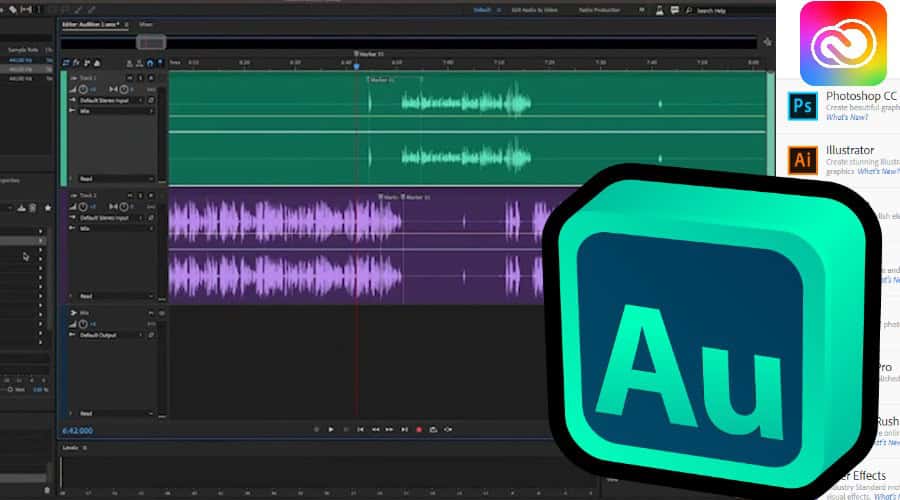
Like Photoshop, Adobe’s Audition is the pros choice when it comes to audio editing. The software provides a huge selection of powerful tools, including recording, multi-track and spectral editing, and batch processing.
Moreover, it has one of the largest libraries of built-in effects and supports third-party VST and AU plugins.
It stands out for its sophisticated noise reduction, click/pop removal, and de-humming tools for restoring damaged audio files.
Plus, it offers advanced mixing and mastering tools. E.g., real-time EQ, dynamics processing, and surround sound support. One of its newer features is variable playback speed.
As part of the Adobe Creative Cloud, Audition works seamlessly with other Adobe applications for a more streamlined workflow.
| Pros | Cons |
| Advanced features for professionals | Overwhelming for beginners |
| Integrates with other Adobe products | Expensive |
| Restores bad audio | |
| Variable playback speed |
3. WavePad – Best for Recording
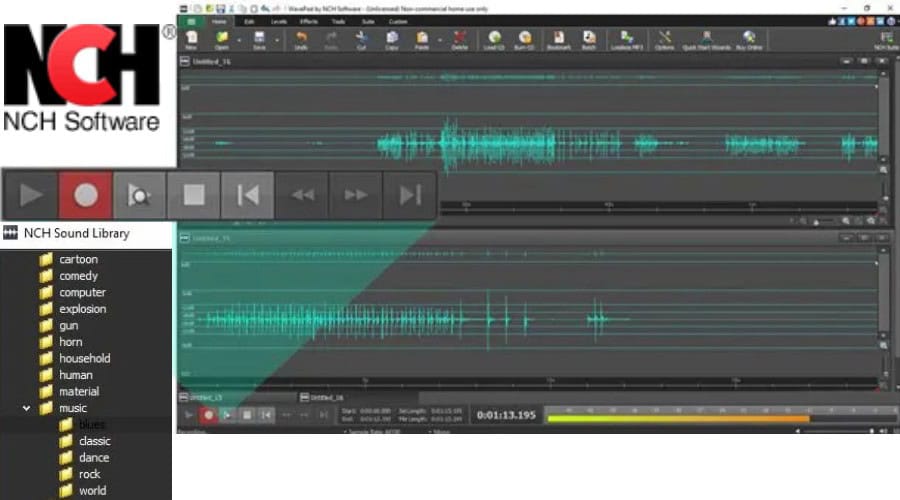
Software giant NCH comes through with its WavePad audio editor for Windows 11.
It stands out with a solid recording option, which supports lots of inputs, not just your mic.
Moreover, its library of hundreds of effects includes everything from sound normalization and silence to voice-changing and enhancements.
Its batch capabilities are also impressive, allowing you to convert or join multiple files in a single process.
Wavepad would be higher, but no multi-track recorder or mixer holds it back, considering it can record audio, music, and sounds.
For the Master’s Edition that includes sound effects and VST plugins, it’s $80/yr. You can also benefit from a 14-day free trial.
| Pros | Cons |
| Excellent for recording and voice changing | No multitrack recorder or mixer |
| Hundreds of effects | Master’s Edition needed for SFX library |
| Batch Editing | |
| 50+ supported audio filetypes |
4. CyberLink AudioDirector – Unique Features
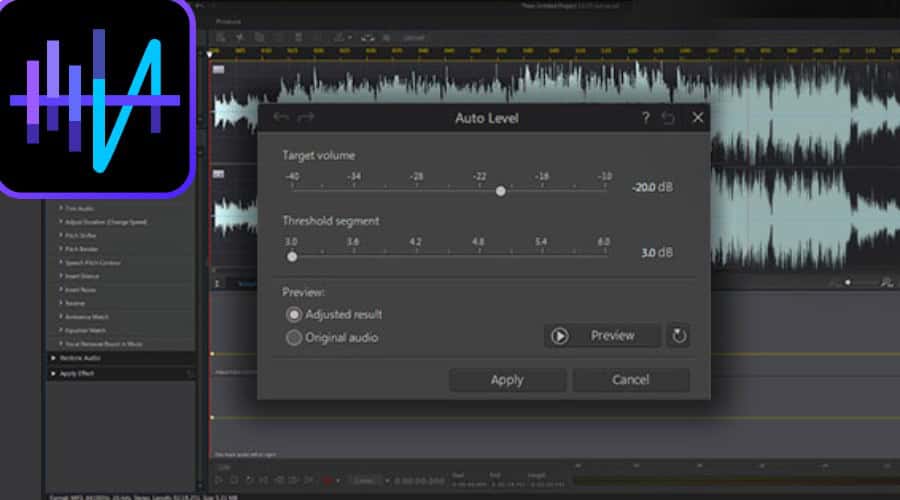
AudioDirector is a comprehensive suite packed with features for experienced users. You get the bases covered, including advanced recording, editing, mixing, and enhancement presets. As well as other common effects.
AI now speeds up some tasks and enhances quality, and it has several features not found elsewhere.
For example, equalization settings can be saved as a preset and applied to different tracks and recordings to quickly unify a project.
Furthermore, its plosive sounds tool is one of the best pop and sound peak filters on the market. It works for talking, singing, and music, when mics fail.
Its Punch and Roll feature also deserves praise. This lets you record second takes within a longer recording without altering it.
CyberLink’s AudioDirector has the pros in mind and lives up to the hype with several unique features. However, its steep learning curve and $75/yr pricing prevents it being my first choice.
| Pros | Cons |
| Comprehensive suite of features | Steep learning curve |
| Integrates with other Cyberlink apps | Expensive annual plan |
| Some AI tools | |
| Several unique tools not found elsewhere |
5. Audacity – Best Free Audio Editing Software
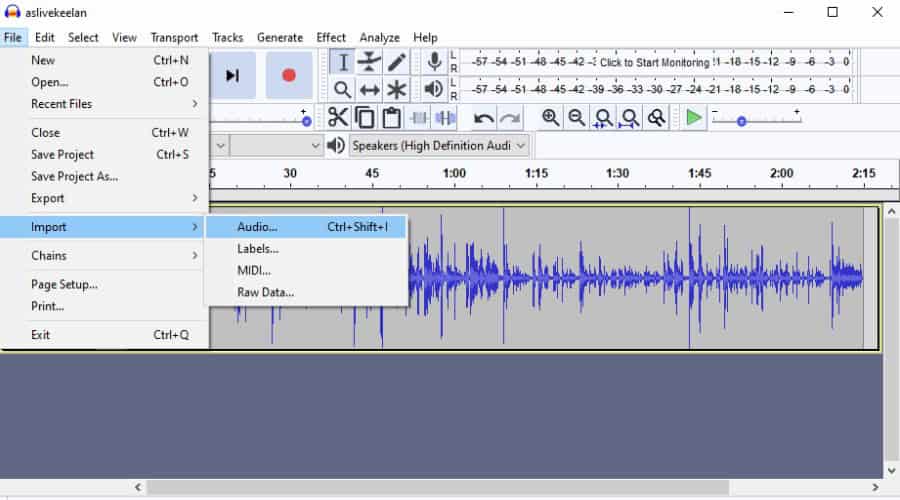
Audacity is a free and open-source audio editing software for Windows 11. It’s widely used for recording, mixing, and mastering audio files.
It offers a wide variety of effects, such as noise reduction, compression, and equalization. These can be previewed and undone with ease.
Audacity also includes tools for visualizing and analyzing audio, such as spectrogram and waveform views.
It supports a wide range of popular file formats, allowing you to import, edit, and export audio projects. You can also save projects for working on later.
VST plugins are supported, but it doesn’t provide any natively.
While there are no video to audio options and it lacks some advanced features, it’s a good choice for those looking for a free and powerful audio editing solution.
| Pros | Cons |
| Supports all common audio file formats | Lacks advanced features |
| Wide variety of effects and VST support | Cannot take audio from video files |
| Intuitive user interface | |
| Free and open source |
6. GoldWave Audio Editor – Best Vocal Remover
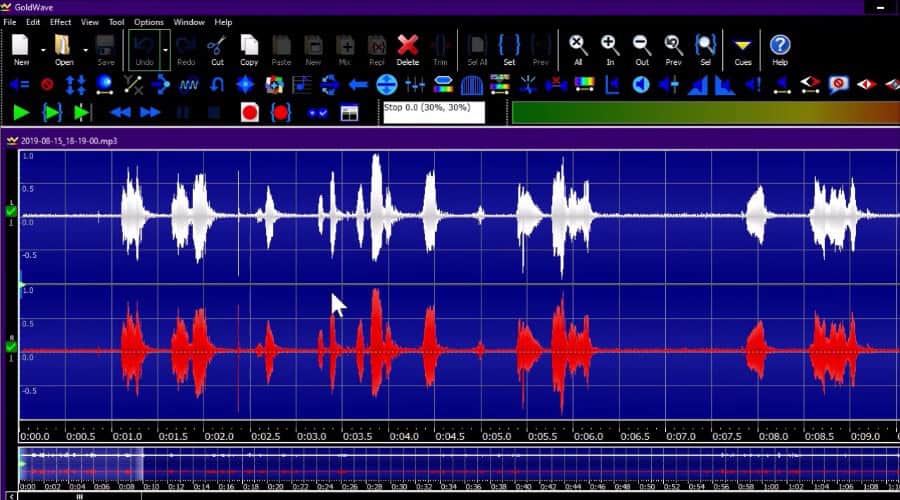
GoldWave Audio Editor is a good all-rounder for beginners and intermediate skill levels. The Windows version has an appealing modern interface and ticks all the boxes for audio editing. I.e., recording, multi-track editing, and mixing.
It particularly excels at vocal removal from songs, leaving the music undistorted and high quality. It promotes this for karaoke, but the feature obviously works for any purpose.
GoldWave boasts over 100 presets and 40 effects, DX and VST plugin support, and excellent visuals. For example, bar graphs, waveforms, level meters, and spectrograms.
I like that it supports up to 4GB in file size and can batch process hundreds of files. Moreover, it works with m4a, wav, wma, mp3, ogg, aiff, au, vox, FLAC, and iTunes.
The highly customizable software is $59 for a lifetime license or $19/yr. The free version limits you to 250 commands per session and non-commercial use.
| Pros | Cons |
| Excels at vocal removal | Can be a system resource hog |
| Free version is very usable | Less effects than other picks |
| Lots of presets | |
| Works with file sizes up to 4GB |
7. OcenAudio – Best Audio Editor for Beginners
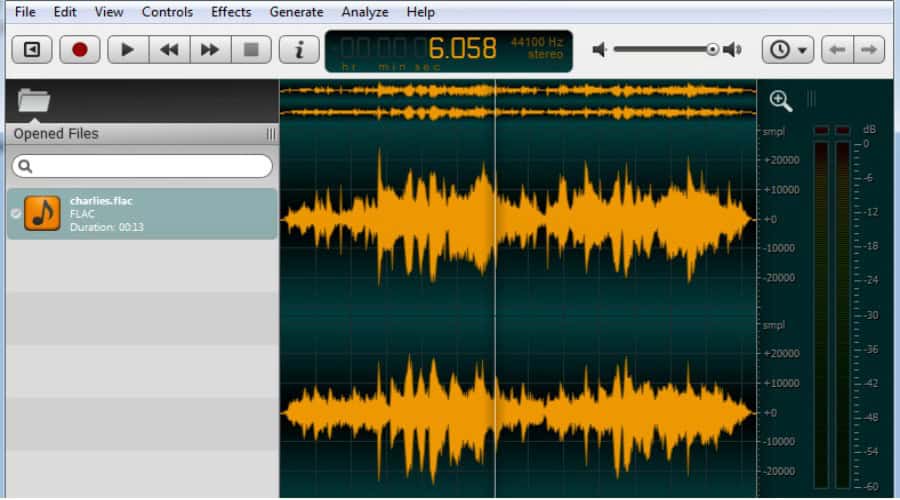
For Windows 11 users that are beginners to audio editing, OcenAudio is a great option. It has a simple and clear interface and sticks to the basics.
You get an intuitive timeline with multi-track support and can easily flip between waveform and spectrogram views.
I like that you can make multiple selections at once, to apply edits to different portions of tracks at the same time.
Moreover, its efficient memory management allows you to work on unlimited audio files of any length without draining system resources.
While it has limited native effects, it does support VST plugins. Similarly, it supports MP3, WAV, FLAC, AAC, M4A, OGG, and other audio file formats, though not as many as my top picks.
The best thing, it’s free to use.
| Pros | Cons |
| Clear and intuitive interface | Lacks some effects and advanced features |
| Multiple selection edits | Others offer more filetypes |
| Lightweight program | |
| Free |
8. Steinberg Cubase – Best for Instrumental Music Editing
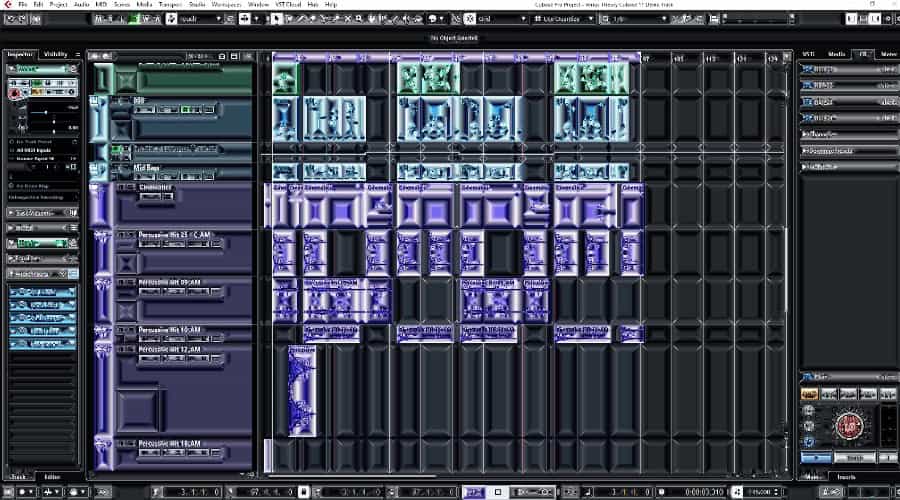
So far, we have focused on audio editing, but for those that create music and edit it, Cubase is the answer. It’s been around since the 80s and is the Windows answer to Apple Logic Pro.
The latest edition is a full digital audio workstation (DAW) that excels at virtual instruments and MIDI editing.
It also lets you edit the audio, much like my other picks after you’re happy with the composition.
Cubase can handle 6 instruments and offers 87 effects. Furthermore, you get a notation interface, mixer view, and auto pitch correction.
It supports unlimited audio tracks but is quite a resource intensive software and a 50GB download.
At $329.99 for the Artist version, it’s only for serious users.
| Pros | Cons |
| Create and edit digital music/audio | Expensive |
| 87 effects and 6 native instruments | A DAW is not focused solely on audio editing |
| Unlimited tracks | |
| Suitable for pros and talented amateurs |
9. Veed Audio Editor – Best AI Audio Editor
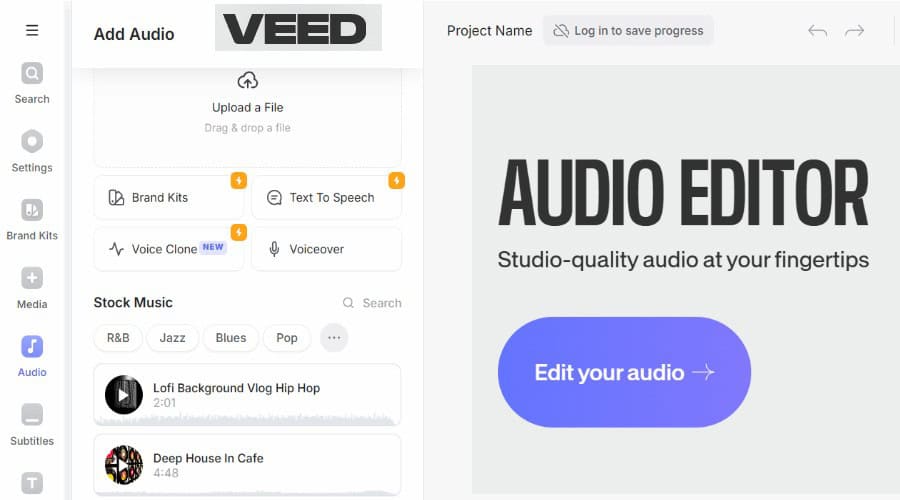
It’s no surprise that AI is now making its way into audio editing and Veed leads the way in features and ease-of-use. As an AI app, Windows 11 users only need to use their browser, so system performance is not an issue.
Veed Audio Editor combines the basic features of standard software – cutting and arranging tracks, with the automation of AI.
For example, automatic noise removal and instant background music and vocal mixing.
Moreover, you can record and enhance audio with AI, add sound effects, and work with multiple filetypes. I.e., MP3, WAV, M4A, and more.
Its drag-and-drop interface makes it perfect for beginners.
Standard editing tools are free, but you’ll need a premium plan starting from $29/mo to get the full power of AI.
| Pros | Cons |
| AI for faster editing features | AI tools require premium plan |
| Studio quality audio enhancement | Not advanced in traditional editing |
| Lots of effect | |
| No software downloads required |
10. Audio Editor: Music Editor – Best for Simple Editing
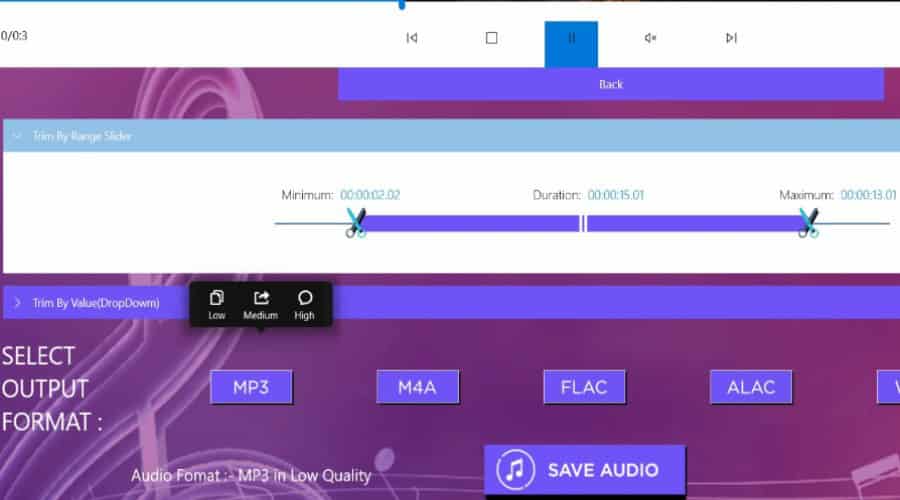
Straight from the Microsoft Store, “Audio Editor: Music Editor” deserves an honorable mention for those that want a quick and basic editor.
Its interface is divided into several tools including: Cutting, Merging, and Converting, including extracting audio from video.
You get a simple timeline editor for trimming, using a range slider, and can export in low, medium, or high quality.
The program supports MP3, M4A, FLAC, ALAC, WMA, and WAV. However, it lacks effects and presets.
| Pros | Cons |
| Easy to use | Limited supported file formats |
| Cut, Merge, and Convert Audio | Lacks advanced mixing and multitrack |
| Extracts audio from video | No effects or presets |
| Free |
Summary
The best audio editing software for Windows 11 depends on your needs. I focused on a variety of leading solutions for multiple budgets, skill levels, and features. However, all do a great job at the basic tasks of editing audio.
My current go-to is AVS Audio Editor for its unique features and affordable full multimedia suite. Those on a budget will benefit from Audacity, while the pros might want to make the leap to Adobe Audition or AudioDirector.
Read our disclosure page to find out how can you help MSPoweruser sustain the editorial team Read more




User forum
0 messages